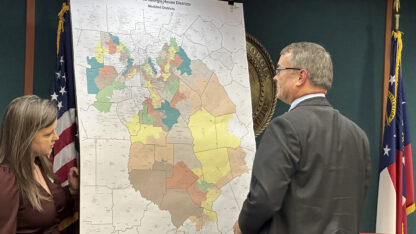Georgia Republicans advance new legislative maps, unveil proposed Congressional map

This story was updated at 5:09 p.m.
Georgia Republican lawmakers unveiled a proposed Congressional map on Friday, which creates a new, majority-Black district in west Metro Atlanta, but seeks to preserve Republicans’ current 9-5 advantage by dismantling a Democratic-voting district elsewhere.
The new map would have five majority-Black districts, compared to the four in the current maps. However, the total number of majority-minority districts would remain unchanged.
In his 516-page ruling striking down Georgia’s current maps for violating the Voting Rights Act, U.S. District Judge Steve Jones warned Georgia lawmakers that they cannot create new majority-Black districts at the expense of existing minority opportunity districts elsewhere.
“The State cannot remedy the Section 2 violations described herein by eliminating minority opportunity districts elsewhere in the plan,” Jones wrote.
The proposed Republican map splits up the current 7th Congressional District centered in Gwinnett County. That district is not majority-Black, but is majority-minority and has voted overwhelmingly for Democrats.
University of Georgia Prof. Charles Bullock says attempting to skirt the court’s instruction is risky.
“I would think that the Georgia legislature would take a lesson from what they saw happen in Alabama within the last few months,” said Bullock, who is the author of “The History of Redistricting in Georgia.”
In Alabama, a court-appointed special master ultimately drew the final congressional map after federal judges found that lawmakers’ revised districts still did not comply with the Voting Rights Act.

Georgia lawmakers advance legislative maps, over Democratic objections
That comes on the heels of Friday votes in the Georgia House and Senate passing their respective redistricting maps just days into a special legislative session that gaveled in on Wednesday. The Senate map adds two majority-Black districts, and the House adds five majority-Black House districts.
The maps must clear the opposite chamber before they go to the governor’s desk.
The Republican-drawn state legislative maps passed over the objection of Democrats, who accused the majority of ramming through maps with scant opportunity for public comment, debate or changes.
Lawmakers are facing a Dec. 8 deadline set by Judge Steve Jones, who found the current districts that were passed in 2021 illegally dilute the power of Black voters. He instructed lawmakers to revise the maps by creating additional majority-Black districts.

Republicans hold majorities in both chambers, so they have near-total control over the process.
“We have complied with the judge’s order,” said Republican Sen. Shelly Echols, the Senate redistricting chair. “He was very clear that he wanted two additional majority-Black districts, and we’ve created two additional majority-Black districts.”
But Democrats say it is not so simple, accusing Republicans of skirting Jones’ order to protect their incumbents and minimize Democratic gains.
In the House, Republicans have paired multiple incumbents into the same districts.
“It does involve a number of incumbent pairings, which, I suppose, was unavoidable because you had to create five new seats,” said Republican State Rep. Rob Leverett, the House redistricting chair.
But the fallout is not equal along party lines. Most of the affected members are Democrats, like Rep. Teri Anulewicz.
“The judges’ order was very specific,” she said. “And I don’t know if these maps are going to be keeping with the spirit of that order.”

Majority-Black districts tend to elect Democrats, so to minimize Democratic gains, Republicans targeted non-Black Democrats elsewhere. Racial gerrymandering is illegal, but partisan gerrymandering is not.
The Republican plan may result in more Black members, but it wouldn’t do much to chip away at the Republican majorities.
In the House, Democrats expect to gain roughly two seats.
In the Senate, the balance of power would be unchanged under the new maps — and Democrats say the Republican maps accomplished that by ignoring elements of the judge’s order, which found that 10 of the current state Senate districts violate the Voting Rights Act.
“Where a majority-minority district has to be created, you can’t satisfy it by moving around people in other areas where no voter discrimination was found,” said Democratic State Sen. Elena Parent, who saw her own district significantly altered. “You have not cured where the court said voter discrimination is found and the process is not equally open to Black voters.”
After the maps pass both chambers and are signed into law by Republican Gov. Brian Kemp, the court will also be under pressure to expeditiously decide whether the revised maps comply with the Voting Rights Act, all before the 2024 election process gets underway early next year.
Democrats believe the maps will be struck down – and a special master will likely be appointed to take over the map drawing.
“If … the judge has to do a special master, then every last one of us, 180 of us, are in jeopardy,” says House Minority Leader James Beverly. “You all have some big decisions to make.”

With the Republican majorities moving to pass their maps at a breakneck pace, Democratic State Sen. Harold Jones lamented the speed, given the weight and complexity of the task at hand. He said that is underscored by the judge’s 516-page ruling.
“And we have basically taken that and condensed it down to three hours of testimony, to make a decision, which is a gigantic decision quite frankly,” Jones said.
The legislature will also need to take up the proposed Congressional districts next week.
WABE politics reporter Rahul Bali contributed to this report.








